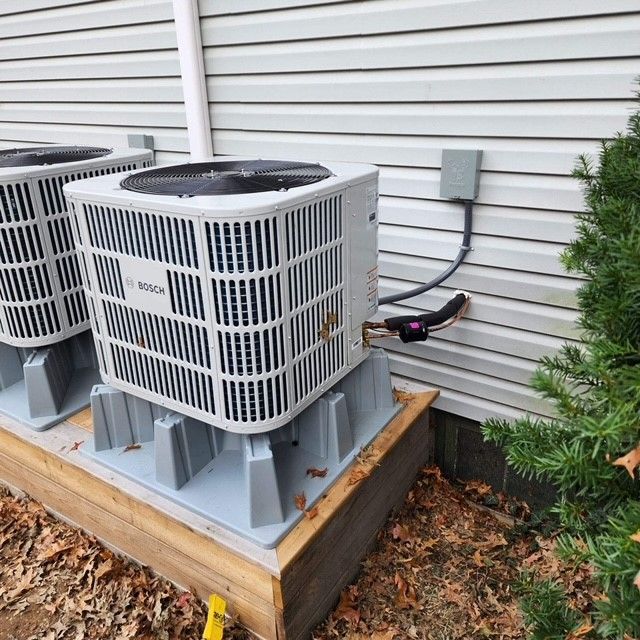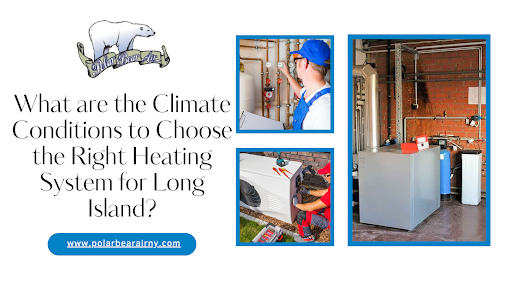HVAC & Heating Insights & Tips

When it comes to reliable HVAC services on Long Island, Polar Bear Air stands out as a trusted name. Specializing in air conditioning, heating, and comprehensive HVAC repair, our team of experts ensures your home or business stays comfortable year-round. Whether you’re searching for an air conditioning contractor on Long Island or need expert heating services, Polar Bear Air is the partner you can rely on. Why Choose Polar Bear Air for HVAC Services? With years of experience serving Long Island residents, Polar Bear Air has established a reputation for quality, reliability, and professionalism. Our comprehensive services include: Air Conditioning Installation and Maintenance: Ensuring your cooling system operates at peak efficiency. Heating Installation and Repair: Keeping your home warm during Long Island’s chilly winters. HVAC Repair Services: Prompt and reliable solutions for all your HVAC needs. Air Conditioning Contractor Long Island As a leading air conditioning contractor on Long Island, Polar Bear Air offers a wide range of services designed to keep your cooling system running efficiently. From new installations to routine maintenance, our skilled technicians handle every task with precision. A well-functioning air conditioner not only ensures comfort but also improves indoor air quality. At Polar Bear Air, we take pride in providing top-notch air conditioning services tailored to the unique needs of Long Island residents. To learn more, visit https://www.polarbearairny.com/air-conditioning. Heating Contractor Long Island Winters on Long Island can be harsh, making a reliable heating system essential. As a premier heating contractor on Long Island, Polar Bear Air specializes in installing, maintaining, and repairing heating systems. Whether you need a furnace replacement, boiler repair, or heat pump installation, we’ve got you covered. Our team understands the importance of a warm and cozy home during the colder months. That’s why we provide efficient and cost-effective heating solutions tailored to your specific needs. Explore our heating services at https://www.polarbearairny.com/heating. Comprehensive HVAC Repair Long Island When your HVAC system malfunctions, it can disrupt your daily routine and compromise your comfort. Polar Bear Air offers fast and reliable HVAC repair on Long Island, ensuring your system is back up and running in no time. Our skilled technicians are trained to diagnose and repair all types of HVAC issues, from minor glitches to major breakdowns. With our commitment to quality service, you can trust Polar Bear Air to handle all your HVAC repair needs efficiently. For dependable HVAC repair services, click here . Benefits of Choosing Polar Bear Air 1. Expert Technicians Our team consists of certified professionals with extensive experience in HVAC installation, repair, and maintenance. 2. Reliable Service We prioritize customer satisfaction and ensure all projects are completed on time and within budget. 3. Energy-Efficient Solutions Polar Bear Air is committed to helping you reduce energy consumption and lower utility bills through high-efficiency HVAC systems. Visit our website at https://www.polarbearairny.com/ to learn how we can help improve your home’s comfort and efficiency. Why Long Island Residents Trust Polar Bear Air Polar Bear Air’s commitment to excellence sets us apart from other contractors. Whether you need an air conditioning contractor on Long Island, a heating contractor on Long Island, or reliable HVAC repair on Long Island, we deliver unmatched service every time. Our goal is to build long-lasting relationships with our clients by providing dependable and affordable HVAC solutions. Contact Polar Bear Air Today Your comfort is our priority. Whether you need a new HVAC system, repair services, or routine maintenance, Polar Bear Air is here to help. As Long Island’s trusted air conditioning contractor, heating contractor, and HVAC repair expert, we guarantee top-notch service tailored to your needs. Click here to schedule an appointment or call us today. Choose Polar Bear Air for reliable, efficient, and professional HVAC services on Long Island!

What's that bizarre sound? That's the question a lot of homeowners in Long Island find themselves asking when their HVAC system starts to act oddly or performance begins to decline. You’ve probably turned to the internet to find the meaning behind these mysterious sounds or changes in operation. Well, without further ado, let's look into HVAC maintenance in Long Island - and uncover the mystery that is HVAC maintenance. Recognizing the Signs Getting to know when it’s time for some TLC towards your system doesn’t necessarily need a PhD. Just some regular check-ups and spotting these signs: *Unusual sounds coming from your unit. *Steeper energy bills than usual. *The system struggles to keep up with the temperature setting. *Dampness or condensation within your place. In a nutshell, if you're not as cool or warm as you'd like to be, it’s time for a maintenance check! Pay close attention to any changes in temperature or humidity, as those can be indicators of a larger issue. Why Seasonal HVAC Maintenance? 'Why now?' We can hear you ask. Well, dear reader, the answer is simple. Regular maintenance keeps your system at peak performance, saving you the dread of sudden breakdowns and costs. Secondly, and this is the big one, safety. Cracks or leaks in your system can release carbon monoxide into your home. This colorless, odorless gas is extremely dangerous. Regular checks keep you safe! The Truth about Energy Efficiency Let us tell you something, friend. If your HVAC system is having a hard time catching up with the set temperature, it's most likely burning more energy than what's needed. Energy efficiency is not just about saving money, it's also about lessening our environmental impact. By getting your HVAC system regularly maintained, you're doing your part in promoting a cleaner, healthier environment. Dealing with HVAC Emergencies Even the most vigilant homeowners can face HVAC emergencies. But do not fret. Knowledge is power! Recognize emergencies like a severe leak, sudden heating (or cooling!) loss, and awful smells. For instances like these, don’t delay reaching out to your HVAC installation in Long Island professional. Because when it comes to emergencies, your safety is paramount. Regular HVAC Maintenance can prevent minor issues from escalating into expensive repairs or replacements. Think of it as taking your car for an oil change or deciding to floss your teeth daily. Little actions can help dodge huge inconveniences down the line. Finding the Right HVAC Contractor in Long Island After recognizing the signs, the next step is finding the right contractor. Here comes the big question, "Who should I call for my HVAC Installation in Long Island?" Many will provide you with these services, but there are not many, like Polar Bear Air. A family-owned business with over 27 years of experience? It’s as comforting as a bowl of warm soup on a chilly day! We all know the old saying, and it couldn't be more accurate when it comes to keeping your home comfortable. How about those Air Conditioning Services? We all crave that sweet, cool air during a scorching summer, right? Therefore, investing in top-tier air conditioning services in Long Island is crucial. Regular servicing ensures your unit has a long, efficient lifespan. So, next time you feel your home isn't quite as frosty as you’d like, you know whom to call! Time for an HVAC Upgrade? Do you feel like your old unit just isn't cutting it? Maybe it’s time for an upgrade! Modern HVAC systems are more reliable, efficient, and eco-friendly. They come bundled with smart features that not only make life more comfortable but also streamline energy consumption. A reputable air conditioning service in Long Island, like Polar Bear Air, can guide you through the process. It's like giving your home a mini-makeover that you'll surely love! Your Next Step? HVAC maintenance and care don't need to be complicated. With the right knowledge, you can stay ahead of the game and ensure that you and your loved ones are comfortable year-round. Remember, it's all about recognizing signs, regular maintenance, and having the right contractor at your fingertips. Annoyed by the sub-par HVAC performance? Contact your local Air Conditioning Contractor in Long Island – Polar Bear Air! Their priority is keeping you comfortable year-round. Hop on a quick call to 1-631-698-4617 and experience top-notch service! Frequently Asked Questions How often should I schedule HVAC maintenance? Regular maintenance is best done twice a year – once before the summer season and once before winter. Why are my energy bills increasing? If your energy bills are on the rise, it might be stemming from the inefficiency of your HVAC system. Regular maintenance can mitigate this issue. What if my HVAC system needs replacement instead of maintenance? Your contractor will advise whether your system needs repairs or a complete replacement. Trustworthy contractors will provide cost-effective and efficient solutions.

Clean air is necessary, whether you work in an office or live in your own home. This is a significant advantage of an HVAC system. High-quality air is supplied to your home by an effective and contemporary HVAC system that heats and cools it appropriately. It also aids in cleaning your house or place of employment. It can increase your comfort level and productivity in this way. In the long run, this results in more wholesome living conditions. The benefits of HVAC Installation in Long Island are covered in this article. HVAC systems and technology both advance regularly. It's time for you to upgrade to a cutting-edge HVAC system from that outdated air conditioner. Some Advantages of HAVC the system Modern Technology Over the past ten years, significant advancements in HVAC technology have occurred. Modern systems have smarter technology and operate more effectively. Sensors are used by products like them to track the location of your phone and detect when you leave your home. The thermostat can automatically switch to an eco-temperature to save energy once you have left. When something is wrong, your Nest thermostat will automatically notify you by phone. You are instantly alerted to low temperatures that can cause furnace issues or freeze pipes in the winter. You can get the best service from Air Conditioning Services Long Island. Improved Quality of Air Indoors Maintaining adequate ventilation, heating, and air conditioning in your house is essential to keeping everyone comfortable. You can also install Heating Contractor Long Island. Allergies and asthma may be aggravated or brought on by older HVAC systems. Older systems are unable to filter impurities like dust, pollen, and animal dander, which frequently leaves people suffering from seasonal allergies. Mold-related issues can also arise in older units. Allergy sufferers might be adversely affected by mold. The quality of the air inside your house can be significantly enhanced by installing a modern HVAC system. And HVAC Repair in Long Island is very easy. Reduced Energy Costs Older HVAC systems have higher operating costs and are less efficient. A more recent system can operate at maximum effectiveness. About half of the money you pay for energy comes from your heating and cooling systems. You can save money on your monthly payment and reduce your energy use by installing a new HVAC system. Selecting the finest firm for installation is just as crucial as deciding to buy a new HVAC system. A certified expert should do the installation, which should include measuring the system appropriately and checking the ducts for leaks or overly long lengths. Safety Older air conditioners and heaters are frequently powered by antiquated electrical cabling or outdated equipment. Unnoticed electrical line issues might develop into fire threats. When installing a new HVAC system, professionals inspect the wiring that supports the old system carefully and notify homeowners of any potential risks they discover. Remote Access You can use your phone to remotely control your home. You may now set your thermostat to your preferred setting while you're on your way home from work. You can remotely regulate the temperature of your house with connected systems and smartphone apps. Conclusion It is almost impossible to walk into a building these days and not be amazed by the wonders of current HVAC technology. Modern heating and cooling systems can enhance your home's comfort, help you save money, and even pay for themselves if you ever decide to sell. And if you are worried about maintenance, contact HVAC Maintenance Long Island.

Long Island experiences cold winters and humid summers. With varying seasons and weather patterns, having an efficient and adaptable Heating system in Long Island is crucial for comfort and affordability. You need to understand local climate conditions to help determine the most suitable heating solutions for homes and businesses in the region. Long Island Climate and Weather Patterns It is situated just east of New York City, Long Island stretches 118 miles and contains Nassau County to the west and Suffolk County to the east. The Atlantic Ocean moderates coastal temperatures year-round but cold fronts from the north and northwest bring winter freezes. Long Island has a location and landscape that creates variable seasonal weather patterns. The Atlantic Ocean moderates coastal temperatures but winter cold fronts from the north bring freezing conditions. Winters are often very cold and damp while summers are hot and humid. Average temperatures fluctuate widely from below-freezing in winter to over 80 degrees Fahrenheit in summer. Changing seasonal fronts also means rapid weather transitions in spring and fall. Long Island’s climate demands adaptable, high-efficiency heating and cooling systems in homes and businesses year-round. Winter Weather Winters are often cold and damp. The average high temperature from December to February ranges from 37–46°F while average lows fall between 21–31°F. However, frigid Polar Vortex cold snaps can drop readings below zero. Snow accumulations frequently cause travel issues. Spring and Fall Seasons Spring and fall see fluctuating conditions with cold fronts and nor’easters interspersed among mild, comfortable stretches. March-May average highs reach 47–69°F while September-November ranges from 61–72°F during the day. Evening temperatures commonly dip to freezing. Summer Heat and Humidity Summers boast hot, humid weather courtesy of moisture from the Atlantic. Average June through August high temps exceed 76–84°F. Combined high humidity levels create heated discomfort. Afternoon pop-up thunderstorms offer limited relief. How Climate Directs Heating Needs Long Island’s varied seasonal temperatures and weather patterns mean Water Heaters in Long Island must adapt to both freezing winters and sweltering summers. Heating oil and natural gas systems offer economical heat for the cold while efficient air conditioners provide summer cooling and dehumidification. Heating Requirements Homes require supplemental heating from October through May when temperatures drop below 50°F. Cold snaps into the teens or single digits mean heating systems must power on full blast to counter freezing conditions. For consistent comfort through changing forecasts, forced hot-air furnaces prove economical performers. Air Conditioning Needs Air conditioning provides necessary relief from heat and oppressive humidity between June and September when indices exceed 90 degrees. Cooling systems must keep pace with consecutive high-temperature days around 80–90°F or higher. Central air conditioning systems effectively meet these demands. Shoulder Season Efficiency Spring and fall’s up-and-down temperatures require a balance between heating and cooling. High-efficiency heat pumps both heat and cool homes as needed with one streamlined system, providing custom comfort sans switching. Top performers like these minimize shoulder season energy costs. Matching Heating Systems to Climate Numerous heating systems exist to contend with Long Island’s heating and cooling needs. Compare options to select the models best aligned with local weather patterns and individual household requirements. Furnaces Gas and heating oil-fired forced-air furnaces make up the majority of winter warmth. The combustion process heats air blown through ductwork via a blower to warm living spaces quickly and economically. New higher efficiency models ensure cozy yet affordable heating even amid dropping temperatures. Boilers Hydronic boilers use oil or gas to heat water and then circulate it through radiators or below-floor tubing to heat interiors gently. Less affected by drafts, they provide consistent warmth despite frigid conditions. Condensing boilers achieve over 95% efficiency for substantial savings. Electric Heaters While less common for whole-home heating, electric units like baseboard heaters, wall heaters, and space heaters offer supplemental warmth. Thermostat-controlled electric heat pumps also both heat and cool. Carefully sized systems provide comfort to the economy. Air Conditioners Relief from summer swelter arrives courtesy of central air conditioning. When the mercury rises, the refrigerant cooling cycle absorbs interior heat and then discharges it outdoors to lower indoor temperatures and humidity. Powerful compressors allow these climate control systems to keep up with consecutive 90+ degree days. Professional Guidance Pays With advanced heating and cooling equipment available, professional assistance ensures proper sizing, informed installation, and service for systems continuously maintaining comfort despite Long Island’s variable climate. The Heating Contractor Long Island at Polar Bear Air NY offers reliable heating and air conditioning solutions to match any weather scenario. Contact them online at www.polarbearairny.com for home evaluations and customized warming and cooling proposals fitting both households and budgets long-term. Investing in the right heating equipment tailored to local conditions saves money over the many heating and cooling seasons.

Maintaining a comfortable and efficient home environment is a top priority for many homeowners in Long Island. The HVAC system plays a crucial role in ensuring your living space is cozy and inviting, but like any mechanical system, it can experience problems over time. In this informative article, we'll explore some of the most common HVAC problems in Long Island and guide when you should call for professional repair services. Thermostat Malfunctions The thermostat is the command center of your HVAC system, and if it's not functioning correctly, it can lead to a host of problems. Issues such as inaccurate temperature readings, the inability to adjust the temperature, or the thermostat failing to turn the system on or off can all be indicative of a thermostat malfunction. If you're experiencing any of these problems, it's best to call a professional HVAC Repair Long Island technician to diagnose and resolve the issue. Refrigerant Leaks Refrigerant is the lifeblood of your HVAC system, and a leak can result in a significant loss of cooling power. This problem can be challenging to identify, as refrigerant leaks are often subtle and may not be immediately noticeable. If you notice your HVAC system struggling to maintain the desired temperature, or if you hear unusual noises coming from the unit, it's a good idea to have an HVAC Long Island technician inspect the system for potential refrigerant leaks. Compressor Failures The compressor is a critical component of your HVAC system, responsible for circulating the refrigerant and generating the cool air that's distributed throughout your home. If the compressor fails, it can lead to a complete breakdown of your HVAC system. Signs of a failing compressor include loud noises, reduced airflow, and a lack of cool air. Addressing compressor issues promptly is essential to avoid a more costly and disruptive system replacement. Water Leaks HVAC systems in Long Island often include a condensate drain line to remove excess moisture from the system. If this line becomes clogged or damaged, it can lead to water leaks, which can cause water damage and even mold growth in your home. Keep an eye out for standing water around your HVAC unit, and don't hesitate to call an Long Island technician if you notice any leaks. Final Thought Keeping your HVAC system in top condition is essential for maintaining a comfortable and energy-efficient home in Long Island. By being aware of common HVAC problems and knowing when to call for professional repair services, you can proactively address issues before they escalate and cause more significant damage. If you're experiencing any HVAC problems in Long Island, don't hesitate to reach out to the experts at Polar Bear Air. Our team of skilled HVAC Repair Long Island technicians is dedicated to providing prompt, reliable, and affordable service to keep your home or business comfortable all year round. Visit www.polarbearairny.com to learn more about our Water Heaters Long Island and HVAC Installation Long Island services, and to schedule your appointment today.

What Determines an HVAC's Lifespan? First off, you might be asking, "How long should my HVAC system last?" With HVAC Maintenance Long Island experts weighing in, the general consensus is that a well-maintained system should serve you for about 15 to 25 years. But, of course, this number isn't set in stone. However, a number of factors can influence how long your HVAC kicks on for those chilly nights or cools down your summers: Regular Maintenance: This is a biggie. Just like your car needs regular oil changes, your HVAC system thrives on regular check-ups. It's fascinating how a simple annual inspection can add years to your system's life. Quality of Installation: Getting your system installed by seasoned pros can make all the difference. Incorrect installation can lead to a host of problems down the line, ultimately reducing the lifespan of your HVAC. Usage Patterns: How often and how intensely you use your system can also play a role. Running your HVAC on full blast 24/7, particularly during extreme weather, can lead to faster wear and tear. Tips for Maximizing Your HVAC's Lifespan So, how can you ensure your HVAC system lives a long and healthy life? Here are some handy tips straight from HVAC Repair Long Island experts: Keep up with Regular Maintenance: Can't stress this enough. An annual tune-up by a professional can help catch issues before they become big problems. Change the Filters Regularly: A dirty filter can make your HVAC work harder, which, in turn, can shorten its lifespan. Changing the filters every few months is a small step that goes a long way. Don't Ignore Repairs: If you suspect something's not right, call in the professionals. Delaying HVAC repair in Long Island can exacerbate the issue, leading to more damage and a shorter lifespan for your system. When to Consider Replacement: Alright, so your HVAC system has served you well, but No system lasts forever. How do you know it's time to bid farewell to your old friend and welcome a new one? Here are a few signs: Frequent Repairs: If you're on a first-name basis with your HVAC technician due to frequent repairs, it might be time to consider a replacement. Increasing Energy Bills: An HVAC system losing its efficiency can lead to a noticeable increase in your energy bills. Inconsistent Temperatures: If some rooms are too hot while others are too cold, your system might be struggling to distribute air properly. Investing in a new system, especially one installed by HVAC Installation Long Island experts, can provide not only improved comfort but also significant energy savings in the long run. Making the Right Choice: You may find that deciding whether to repair, maintain, or replace your HVAC system requires some thought. However, learning the factors that affect its lifespan and being aware of the signs that indicate it’s time for a change can help you make an informed decision. Remember, investing in your HVAC system is not just about ensuring you have heating or cooling on demand; it’s about securing a comfortable, energy-efficient home environment for the future. If you're considering taking a step towards a smarter, more efficient HVAC system or just aiming to extend the life of your current setup, consulting with a trusted HVAC Repair Long Island specialist can set you on the right path. They can offer personalized advice and solutions, ensuring your home stays comfortable year-round, no matter what the weather throws at you. What Next? You're equipped with the knowledge to make informed decisions about your HVAC system's maintenance, repair, and possibly even replacement. If you're leaning towards a new installation, recall that a skilled HVAC Installation Long Island service can ensure your new unit kicks off to a great start, promising you years of comfort. Still, got questions? Don't sweat it. Reaching out to a local HVAC expert can provide you with answers tailored to your specific situation. Remember, ensuring your system's health is key to enjoying a comfortable home environment year-round. Final Words: Curious about the latest in HVAC technology and how it can benefit your home? Upgrading your system might be the refresh your home needs to stay cozy and efficient in every season. Why not explore the possibilities today? So, what are you waiting for? A small action today can lead to significant benefits tomorrow, keeping your home's comfort system at its best for years to come.

